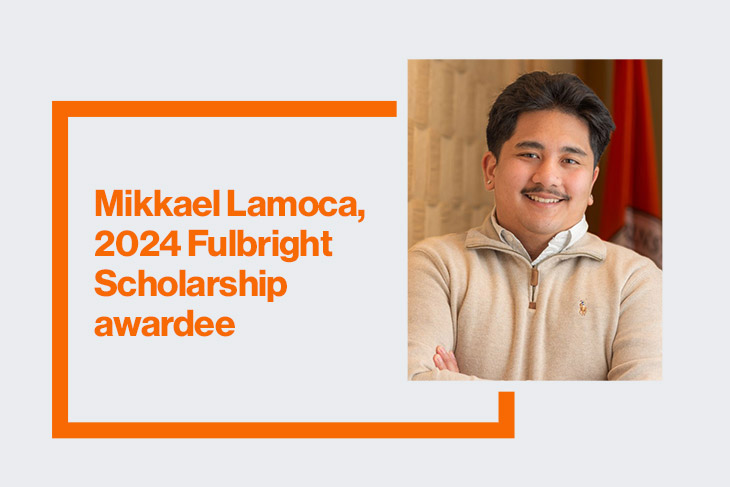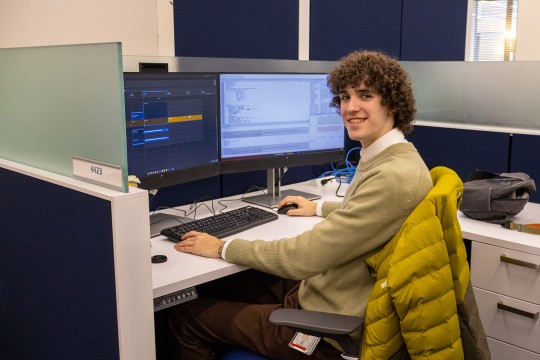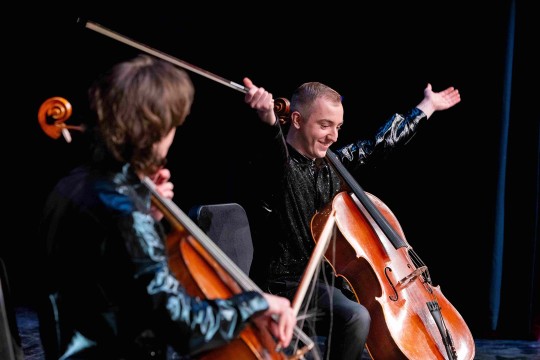Mikkael Lamoca receives Fulbright scholarship to complete cutting-edge STEM cell research
Mikkael Lamoca ‘24 (biomedical engineering), ‘24 MS (science, technology, and public policy) travels to Singapore for Fulbright scholarship research
Provided
Mikkael Lamoca ‘24 (biomedical engineering), ’24 MS (science, technology, and public policy) will travel to Singapore to conduct research as part of his Fulbright scholarship.
Conducting hands-on research was a hallmark of the time Mikkael Lamoca ‘24 (biomedical engineering), ‘24 MS (science, technology, and public policy) spent at RIT. A Fulbright award presents him a new opportunity to conduct cutting-edge research at one of the top universities in Asia.
Meet the other 2024 Fulbright U.S. Student awardees
Joseph Casale will analyze aerial hyperspectral imagery to map the species of trees in Malaysia.
Peyton D’Anthony will teach English in Kosovo.
Emma Herz Thakur will create connections between artisans and museums in France.
Izzy Moyer will work with The State Archives in Dubrovnik, Croatia.
Lamoca’s award will fund a 10-month research experience in the BioIonic Currents Electromagnetic Pulsing Systems (BICEPS) Laboratory at the National University of Singapore. He is one of a record six Fulbright U.S. Student awardees this year from RIT.
His research focuses on age-related neurodegeneration, which can be seen in Alzheimer’s disease, dementia, and other conditions. There is previous research regarding how STEM cell injections can help with these conditions, but, according to Lamoca, there is contradicting information and evidence which indicates this method may not be the best approach.
Instead, Lamoca will explore how magnetic stimulation can induce secretome production to achieve therapeutic neuroprotective effects.
“One of the biggest reasons I wanted to work with this lab is that I would be the first person there to do this type of research on neuroprotection, and that I would have access to work with the lab’s patented technology. This lab established all of the processes for magnetically induced secretome production, so I’m going to use their methods to see if it can be applied to neuroprotection efforts,” said Lamoca.
When looking for co-op opportunities during his second year at RIT, Lamoca, from Santa Clara, Calif., was introduced to RIT’s Tissue Regeneration and Mechanobiology Laboratory, led by Professor Karin Wuertz-Kozak. His friend, Iskender Mambetkadyrov ‘24 (biomedical engineering), ‘24 MS (science, technology, and public policy), recommended that he inquire about available opportunities in the lab and Lamoca flourished from there.
“Coming into my first year, I didn’t know much about research. My co-op with Professor Wuertz-Kozak was the first time I really started to dive into it. She was my first mentor. Working in her lab is where my love of research started, and I’ve been interested in doing more ever since,” said Lamoca.
After completing his 10-month tenure at the BICEPS laboratory in Singapore, Lamoca hopes to continue his graduate education by earning a Doctorate of Medicine and of Philosophy (MD-Ph.D.) so can practice medicine while conducting research.





